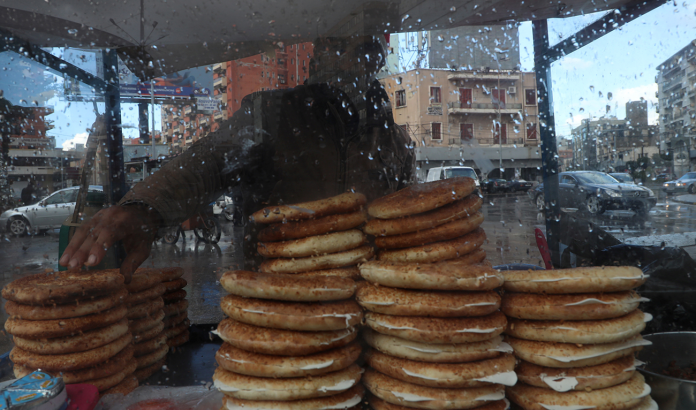BEIRUT: Bread prices in Lebanon rose by LBP250 ($0.17) on Tuesday, the second increase in less than a month, with 930 grams of the basic foodstuff now costing LBP2,500.
A family would need around LBP75,000 a month in order to have a pack of bread a day, with the latest price representing 11 percent of the LBP650,000 monthly minimum wage.
The Ministry of Economy blamed the first increase on the global rise in wheat prices and promised to reduce the price “when global wheat prices or the local dollar exchange rate declines because these two factors control the price of bread in Lebanon.”
It gave the same reason on Monday for the second rise. However, neither the price of wheat nor the dollar exchange rate in Lebanon has declined and the dollar exchange rate is approaching LBP9,000 on the black market.
Economic analysts fear that a pack of bread could rise to as much as LBP5,000. But the government has not shown an appetite for intervening and providing for the poor, who constitute more than 20 percent of the population. The poverty rate in general exceeds 55 percent.
Bechara Al-Asmar, leader of the General Labor Union, said that aiming to increase bread prices and aiming to raise the price of a can of diesel to LBP20,000 suggested that subsidies on basic materials would be gradually removed.
“The state and financial authorities have not only ignored the misfortunes of hungry people, who belong to vulnerable and labor groups impacted by the daily rise in the prices of food and basic commodities, and the need to hold smugglers of medicine, fuel, and other goods accountable, but it also seeks to make the removal of subsidies a fait accompli without putting forward any economic plan that would restore the purchasing power of the national currency, recovering stolen or smuggled money, or protecting the money of depositors,” he told Arab News.
Hunger would increase, people would be drained and security would be undercut, he warned.
Bread prices are expected to rise even more, with a political stalemate stymying the formation of a new government.
The months-long deadlock undermines Lebanon’s chances of implementing the reforms it needs to unlock vital international financial aid that will help the country out of its economic crisis.
Asmar said the solution was to immediately form an emergency rescue government that was trustworthy and capable of taking the first step before everything fell apart.
Caretaker Prime Minister Hassan Diab on Tuesday chaired a meeting of a ministerial committee that is tasked with studying subsidies.
The National Federation of Employees’ and Workers’ Unions in Lebanon (FENASOL) said it held the caretaker government responsible for the “security shocks” that might result from further impoverishment, starvation, and unemployment.
It called on all labor bodies, trade unions, and civil society to “take to the squares of the Oct. 17 uprising,” a reference to the mass protest movement that rocked the country in 2019.
There was a violent protest in the city of Tripoli a week ago over the deteriorating living situation because of a COVID-19 lockdown. A man was killed and dozens of civilians and soldiers were injured.
A UN study showed that the Lebanese economy shrank by 20 percent in 2020 compared to the previous year due to the decline in private sector activity, dealing a severe blow to the country’s gross domestic product and tax revenues.
The study also showed that private sector sales declined by 45 percent in 2020 compared to 2019, and that 23 percent of employees working in key sectors were laid off.
It forecast that the recession would worsen in 2021 unless the COVID-19 vaccine was “rolled out in a timely manner and unless the necessary political and economic reforms are implemented.”
Rola Dashti, the executive secretary for the UN Economic and Social Commission for Western Asia, urged the development of a national rescue plan for micro, small, and medium enterprises to “reduce unemployment and provide soft loans to meet cash flow requirements in times of emergency to avoid mass bankruptcy and the loss of more jobs.”

Lebanon, World Bank ink social assistance loan agreementLebanon central bank head says figures in some media about Swiss case ‘inflated’

